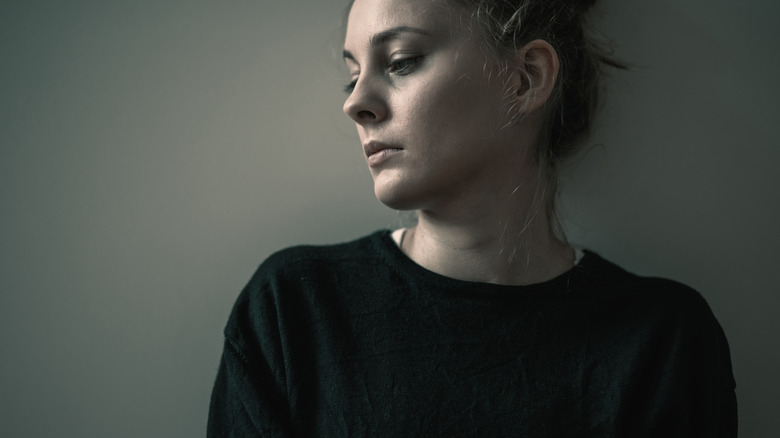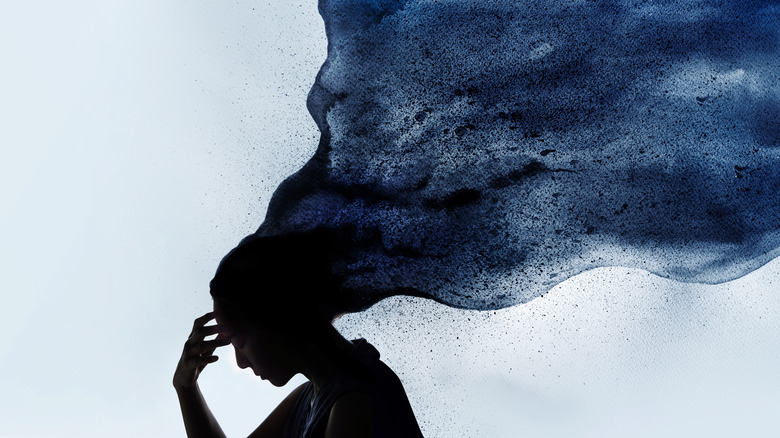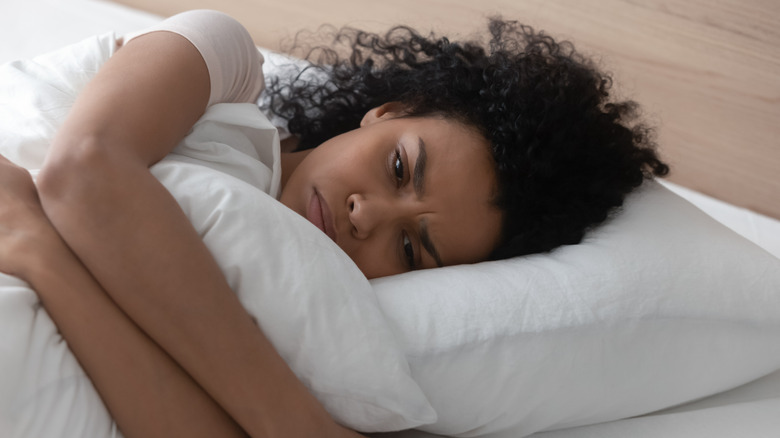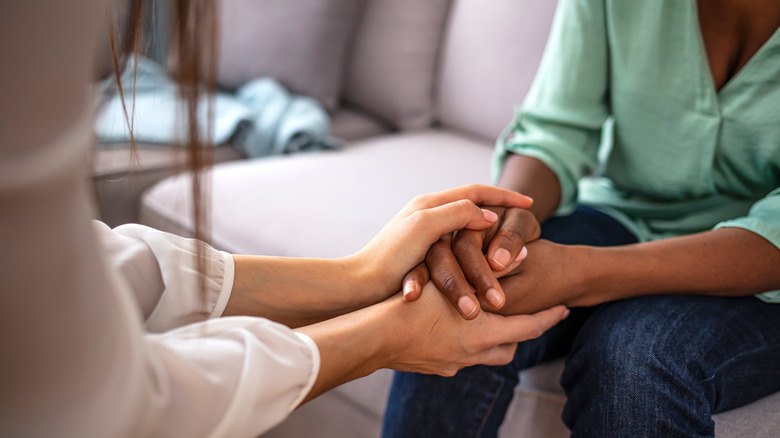The Real Reason You're Afraid Of Death
It's natural for everyone to think about death. After all, it's an inevitable part of life. As Jim Morrison of The Doors famously sang, "No one here gets out alive," via Genius. With so much uncertainty in life, death is one thing we can be absolutely certain of. But despite the fact that we're armed with unequivocal proof and logic, why does the mere thought of it make some of us so uncomfortable while others may scoot through life not giving it much thought at all. If we've been living on this planet long enough, we may have had a brush with death at some point, witnessed a loved one pass away, or been faced with a genetic predisposition that increases our risk of mortality sooner rather than later. We may have real, hits-close-to-home reasons why we fear death. While it's been proven that these kinds of painful experiences often increase feelings of joy, mindfulness, and gratitude in many individuals, these experiences can also induce stress, anxiety, and compulsive fears (via International Journal of Depression and Anxiety).
Why we fear death
A 2019 Statista report found that a staggering 42% of Americans were generally either "very afraid" or "somewhat afraid" of death. It's no wonder then that there's an entire field of study devoted to the psychological impacts of death and dying, called thanatology (via Brittanica). Furthermore, physicians became interested in the fear aspect of dying, and an anxiety disorder dubbed thanatophobia emerged as its own area of study, particularly for palliative and hospice workers who commonly work closely with those who are dying. Note that thanatophobia is different from necrophobia, which is a fear of dead things (via Betterhelp).
Interestingly enough, physicians studying populations with a fear of dying found more than just fear to be the root cause of distress. In psychoanalysis, they also found patients to feel sadness at the prospect of leaving family members behind, and depression over having to leave the world. While the former impacted one's sense of ego integrity, the latter induced a sense of despair, with the individual teetering between both of these psychological impacts during times of distress, via Journal of Natural Science Biology and Medicine. The journal also states that an overwhelming fear of death may arise from trauma, post-traumatic stress disorder (PTSD), or other mental or physical health diagnosis.
Common symptoms of an overwhelming fear of death
First, it may help to understand what constitutes an overwhelming fear or phobia, which is often more impactful than just a fleeting, one-time fear. Overwhelming fears and phobias are usually debilitating and life-altering, often causing a person to reorganize aspects of their life or going out of their way to avoid anything that triggers a reaction. While it's normal to have general fears over the prospect of dying, persistent fears that get in the way of everyday living can become problematic. So what constitutes problematic reactions to death and dying? It's suggested that anything that gets in the way of normal living may warrant attention and a plan for healing, via Help Guide. In terms of physical symptoms of a phobia, the NHS suggests they aren't different from any other type of phobia or fear-based anxiety and may include: sweating, trembling, hot flashes, chills, shortness of breath or difficulty breathing, a choking sensation, rapid heartbeat, pain or tightness in the chest, or a sensation of butterflies in the stomach. Psychological symptoms often induce an intense fear that can make one feel like they're going to faint or die. Because many phobias tend to limit one's daily activities, they often cause other mental health conditions like anxiety and depression.
Fear of dying precursors and causes
Common precursors for those with an intense fear of dying are generalized anxiety and depressive symptoms (via Journal of Natural Science Biology and Medicine). Conversely, those who don't experience an overwhelming fear of death often share these common characteristics instead: high self-esteem, religious beliefs, good health, a sense of life fulfillment, intimacy with family and friends, and a fighting spirit. Keep in mind that these are common characteristics and not a guarantee of whether or not one has an overwhelming fear of death. Furthermore, while any phobia can be the result of unresolved trauma, thanatophobia and intense fears around death are commonly associated with an early traumatic event that had to do with death or dying that created psychological distress, via Medical News Today. Additionally, the way we grieve a loss may provide some important clues. The OMEGA Journal of Death and Dying conducted a 2020 study that found a significant association between prolonged grief symptoms and a fear of death. Perhaps even more surprising, researchers in that study also found old age to be more indicative of a neutral, more accepting attitude towards death, and the ability to find meaning in death.
Therapy-based healing mechanisms
If you're struggling with fear-based thinking or a phobia about dying, rest assured there's help and hope. You don't have to suffer or attempt to heal alone if you don't want to. By enlisting the help of a therapeutic-based specialist, individuals can work through some of the deeper rooted, core issues that may be causing the fear to begin with. A common technique for anxiety and fear disorders is cognitive behavioral therapy (CBT). CBT is a highly efficacious form of talk therapy and is considered by many clinical professionals to be the gold standard of therapy, according to Frontiers in Psychiatry. Because of its goal-oriented approach, CBT typically has a set number of sessions in which the patient identifies negative thinking patterns and replaces them with new, healthier ways of responding to fear and anxiety, via Mayo Clinic. When choosing a therapist, you may want to look for a licensed professional who has experience using CBT in their practice and specifically helps with phobias and anxiety disorders.
Medication considerations
While talk therapy is a great help for many on their healing journey, there's no shame in getting an additional layer of support if needed. Depending on the level of discomfort you may be in, your doctor or therapist may recommend medication. In most instances where medication is prescribed for a mental health condition, the patient is usually receiving some form of counseling or talk therapy in conjunction with their medication. Two common front-line therapies for anxiety-based mental health conditions and phobias are beta blockers and sedatives. According to the Mayo Clinic, beta blockers work by inhibiting adrenaline's effects on the body, like rapid heart rate and uncontrollable shakiness. Sedatives are typically a class of medications known as benzodiazepines, which help with overwhelming feelings of anxiety and panic. While these kinds of medications can greatly reduce many of the unpleasant symptoms of fear, panic, and anxiety, they should also be used with caution due to the high potential for substance abuse and chemical dependency formation. It's important to discuss any concerns you have regarding dependency formation with your doctor while starting a new treatment regimen.






